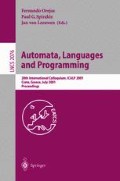Abstract
We study a rather generic communication/coordination/ computation problem: in a finite network of agents, each initially having one of the two possible states, can the majority initial state be computed and agreed upon by means of local computation only? We describe the architecture of networks that are always capable of reaching the consensus on the majority initial state of its agents. In particular, we show that, for any truly local network of agents, there are instances in which the network is not capable of reaching such consensus. Thus, every truly local computation approach that requires reaching consensus is not failure- free.
Access this chapter
Tax calculation will be finalised at checkout
Purchases are for personal use only
Preview
Unable to display preview. Download preview PDF.
References
E. Berger. Dynamic monopolies of constant size. Manuscript, http://xxx.lanl.gov/abs/math/9911125, 1999.
F. Flocchini, E. Lodi, F. Luccio, L. Pagli, and N. Santoro. Monotone dynamos in tori. In Proc. 6th International Colloqium on Structural Information and Communication Complexity, pages 152–165, 1999.
P. Flocchini, E. Lodi, F. Luccio, and N. Santoro. Irreversible dynamos in tori. In European Conference on Parallel Processing, pages 554–562, 1998.
E. Goles and S. Martinez. Neural and Automata Networks. Kluwer, Norwell MA, 1990.
E. Goles and J. Olivos. Periodic behavior of generalized threshold functions. Discrete Mathematics, 30:187–189, 1980.
E. Goles and J. Olivos. Comportement p’eriodique des fonctions ‘a seuil binaires et applications. Discrete Applied Mathematics, 3:93–105, 1981.
E. Goles. Positive automata networks, pages 101–112. Disordered Systems and Biological Organization. Springer-Verlag, 1986.
Y. Hassin. Probabilistic local polling processes in graphs. M.Sc. Thesis, The Weizmann Institute, Rehovot, Israel, 1998.
Y. Hassin and D. Peleg. Distributed probabilistic polling and applications to proportionate agreement. In Proc. 26th International Colloqium on Automata, Languages, and Programming, pages 402–411, 1999.
Y. Hassin and D. Peleg. Extremal bounds for probabilistic polling in graphs. In Proc. 7th International Colloqium on Structural Information and Communication Complexity, 2000.
F. Luccio, L. Pagli, and H. Sanossian. Irreversible dynamos in butterflies. In Proc. 6th International Colloqium on Structural Information and Communication Complexity, pages 204–218, 1999.
G. Moran. Parametrization for stationary patterns of the r-majority operators on 0-1 sequences. Discrete Mathematics, 132:175–195, 1994.
G. Moran. The r-majority vote action on 0-1 sequences. Discrete Mathematics, 132:145–174, 1994.
G. Moran. On the period-two-property of the majority operator in infinite graphs. Trans. Amer. Math. Soc., 347(5):1649–1667, 1995.
N. H. Mustafa and A. Pekeč. Democratic consensus and the local majority rule. Research Series RS-00-08, BRICS, University of Aarhus, Denmark, 2000.
T. Nakata, H. Imahayashi, and M. Yamashita. Probabilistic local majority voting for the agreement problem on finite graphs. In Proc. 5th Computing and Combinatorics Conference, pages 330–338, 1999.
T. Nakata, H. Imahayashi, and M. Yamashita. A probabilistic local polling game on weighted directed graphs with an application to the distributed agreement problem. Networks, 35(4):266–273, 2000.
D. Peleg. Size bounds for dynamic monopolies. Discrete Applied Mathematics, 86:263–273, 1998.
S. Poljak and M. Sura. On periodical behaviour in societies with symmetric influences. Combinatorica, 3(1):119–121, 1983.
S. Poljak and D. Turzik. On an application of convexity to discrete systems. Discrete Applied Mathematics, 13:27–32, 1986.
S. Poljak and D. Turzik. On pre-periods of discrete influence systems. Discrete Applied Mathematics, 13:33–39, 1986.
Author information
Authors and Affiliations
Editor information
Editors and Affiliations
Rights and permissions
Copyright information
© 2001 Springer-Verlag Berlin Heidelberg
About this paper
Cite this paper
Mustafa, N.H., Pekeč, A. (2001). Majority Consensus and the Local Majority Rule. In: Orejas, F., Spirakis, P.G., van Leeuwen, J. (eds) Automata, Languages and Programming. ICALP 2001. Lecture Notes in Computer Science, vol 2076. Springer, Berlin, Heidelberg. https://doi.org/10.1007/3-540-48224-5_44
Download citation
DOI: https://doi.org/10.1007/3-540-48224-5_44
Published:
Publisher Name: Springer, Berlin, Heidelberg
Print ISBN: 978-3-540-42287-7
Online ISBN: 978-3-540-48224-6
eBook Packages: Springer Book Archive

